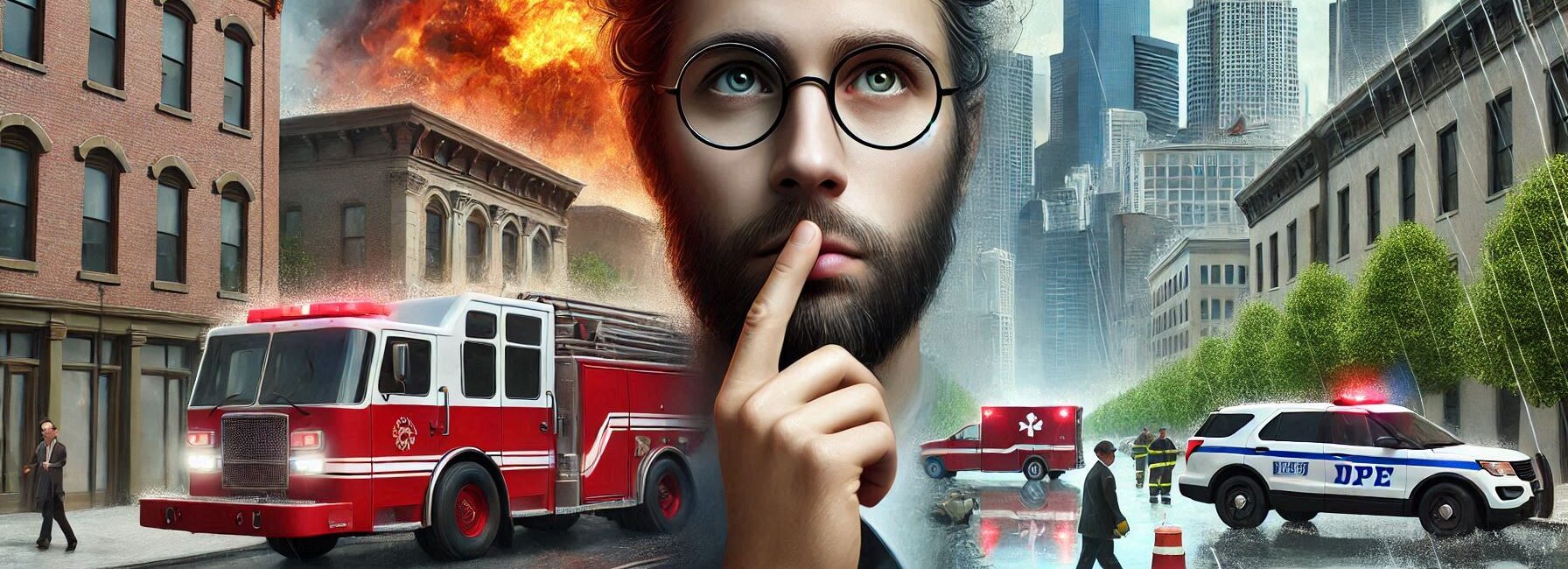Last Updated on November 2, 2025 by Kevin Collier

Top Takeaways and Key Concepts
– Acknowledge fear; it’s a natural response in emergencies.
– Focus on controlled breathing to reduce panic quickly.
– Create a mental action plan for emergencies in advance.
– Stay informed about risks to feel more prepared.
– Support others; helping reduces your own fear levels.
Picture this: you're in the woods, breathing in the fresh air, maybe observing birds, or more likely slapping bugs while pretending to enjoy the beauty around you. Out of nowhere, the bushes start to rustle. Your heart beats faster. Is it a bear? Or maybe your lunch pack is just calling out to you?
Please Note: This post may contain affiliate links. If you click one of them, we may receive a commission at no extra cost to you. As an Amazon Associate, I earn from qualifying purchases.
You can get panicked quickly. Like, really quickly. Have you ever felt your heart race like it's trying to get away? Fear is that small alarm that goes off inside you when something doesn't feel right. But what do you do when the alarm is so loud that you can't think straight? It's like trying to hear your favorite song in a busy café when everyone is talking.
Sometimes, just taking a breath is enough. Take a second. Take a deep breath. Wait a second. Then let it out slowly. This can help you calm down and get your thoughts in order. You might even hear the sounds of nature again. The trees are moving. Birds are chirping. Isn't it calming?
It's a good idea to use your emergency whistle. Just think of how it can say, “Hey!” “Help me!” You could even practice blowing it a few times. That way, you'll know what to do when the time comes.
Imagining yourself in peaceful times can also be very helpful. Picture yourself relaxing by a warm fire or eating your favorite snack. This trick can help you remember that not everything is scary.
It's important to be grounded. Pay attention to what's going on around you. Touch the ground with your feet. Look at the trees. You could even count the clouds. If you pay attention to what's around you, it can help you get rid of that dread.
You can do it! It's normal to be scared. Just remember that being ready makes that fear less scary. Go ahead and take those risks. Trust yourself. You will be alright. 🌲✨
Contents of This Page
*** Shop for Survival Gear - Tools - Kits ***
Survival Gear - Bags and Backpacks - Knives - Boots/Footwear - Communication
Outdoor Cooking - Gloves - Hydration - Dry Boxes - Water Filtration Systems
Tents - Sleeping Bags - First Aid Kits - Multi-Tools - Flashlights - Fire Starters
Navigation - Survival Food - Night Vision - Headlamps - Stun Guns - Binoculars
Understanding Your Fear
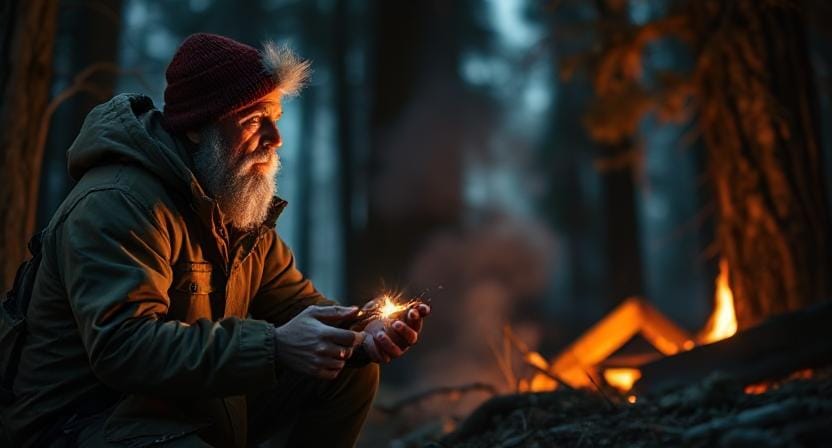
First, let's admit that fear is a normal feeling. Everyone feels scared at some point, whether it's finding a snake while hiking or discovering you've left your favorite food behind (gasp!). It's also important to know what makes you scared.
When I went camping alone for the first time (what was I thinking?), every sound made me nervous. Was it animals or simply my vivid imagination? The most important thing is to be aware of these feelings without allowing them take over.
What am I actually scared of? Is it the situation itself or how I might respond to it? Sometimes just knowing where our worries come from might make them less powerful.
Breathing Methods That Really Work
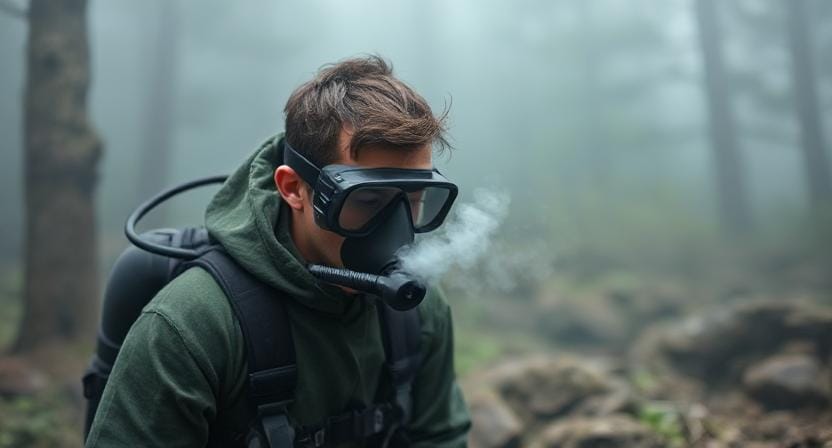
Let's talk about breathing now because, believe it or not, it may make a big impact! When we panic, our bodies typically go into fight-or-flight mode, with our hearts pounding and our breaths coming in short gasps like we're attempting to blow up a very hard balloon.
Instead of hyperventilating, which can make you dizzy and make you make bad choices, try deep breathing exercises.
One useful technique is called diaphragmatic breathing. You know, the kind where you breathe deeply enough that your stomach expands instead of just puffing up your chest like a peacock showing off its feathers?
Take a slow breath in via your nose for four counts, hold it for four counts, and then let it out through your mouth for four counts. Do this over and over until you feel better than you did after eating a whole box of cookies! This method helps you calm down and clear your mind.
Be In The Present Moment
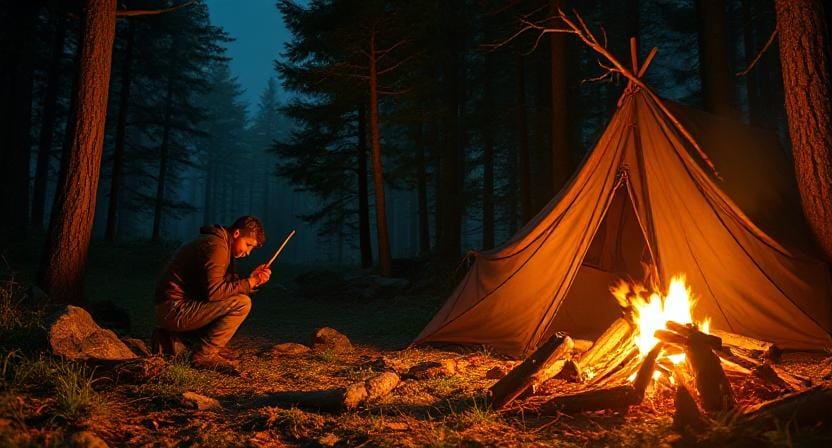
It's interesting because a lot of people think about the worst things that could happen during an emergency, like being left on an island with only coconuts and no Wi-Fi (the horror!). To fight this urge, try to stay in the moment.
When I became lost again, I understood that fretting about what might happen wasn't helping. Instead, I focused on what was around me: the trees waving in the breeze and the route ahead that led someplace!
You can ground yourself by paying attention to small things, like a leaf falling or birds tweeting. This can help you change your nervous thoughts into more bearable ones.
Make a Plan Of Action
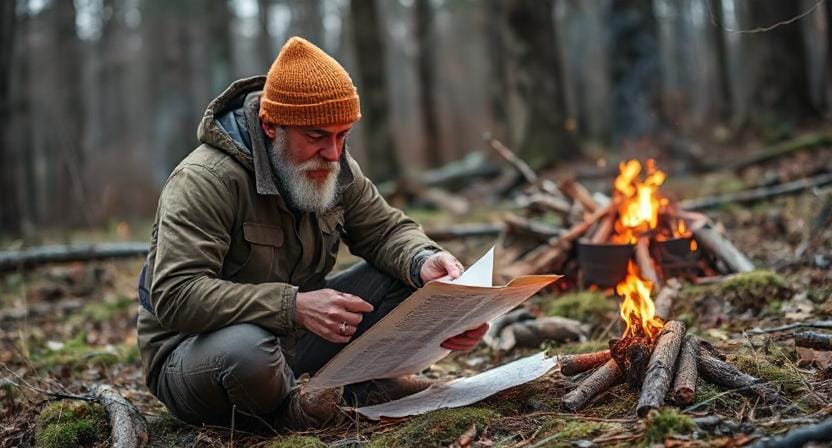
Having a plan of action can help you feel better in an emergency. It's like having a secret weapon against panic! It helps to know what to do if something goes wrong, such bringing extra snacks (extremely crucial!) or knowing how to ask for help.
Before going camping or hiking alone, make simple preparations about what to do if something goes wrong, like “If I get lost…” or “If wildlife comes near…” If you need to, write these down! When things go crazy, knowing that there are already actions planned out provides you confidence and clarity.
Use Humor To Protect Yourself

Let's be honest: sometimes laughter really is the best medicine, even when things are really bad! Finding humor in dread can help us deal with weighty emotions and remind us not to take ourselves too seriously. Imagine this: Bears are all around you, ready to eat, but then you realize they think your bag is their picnic basket!
When things get stressful, humor can help you forget about them and feel better. It takes the focus off of worry and puts it on lightheartedness. This is a reminder that even though life might throw us curveballs (or bears) at any time, we still have power over how we respond!
Seek Support From Others
Let's talk about something really cool: getting help from other people. Don't take it lightly! Think about going camping with pals. Or going for a hike with other folks and sharing tips. It feels good, doesn't it? Things can change a lot when you have other people around, especially when things go wrong.
I recall this one time I went hiking. Wow, it was a crazy ride! We got caught in rainstorms that came out of nowhere (those weather apps can be tricky, can't they?). We all huddled under tarps instead of panicking out. Can you see it? We were laughing and exchanging food, even though our shoes were wet. Instead of being scared, it developed into a delightful little celebration.
Being with pals helps you feel less stressed. You know you're not the only one. It's like telling someone a secret that makes everything better. Sometimes your feelings can be too much to handle, but talking or laughing can help.
Get in touch if you're feeling too much. Talk to a friend, send a brief text, or even talk to another hiker. That connection might help you feel better and make problems seem smaller.
So the next time you're out there, think about who you're with. When things are hard, such people can help you stay strong. You never know, a good laugh could make a bad day into a wonderful memory!
Frequently Asked Questions
Is fear normal in an emergency?
Yes, fear is a natural response and acknowledging it can help you stay mentally grounded instead of overwhelmed.
How can breathing techniques reduce panic?
Slow, deep breathing helps regulate heart rate, relax muscles, and restore clearer thinking during stressful moments.
Why should I create a mental action plan?
Having steps prepared in advance reduces hesitation, helps you think faster, and builds confidence when something goes wrong.
What does staying present mean in a crisis?
It means focusing on what is happening around you physically instead of imagining worst-case scenarios that fuel panic.
Does staying informed actually reduce fear?
Yes, understanding risks, conditions, and procedures improves clarity and reduces fear caused by uncertainty.
Can humor help during stressful events?
Laughing or shifting perspective can break fear cycles and release tension, making it easier to think clearly.
Why does helping others lower my panic level?
Supporting others shifts focus away from fear and creates connection, which boosts emotional stability during emergencies.
Suggested Resources:
How to Stay Calm During Emergencies
https://www.ready.gov/staying-calm-during-emergencies
Emergency Preparedness Tips
https://www.redcross.org/get-help/how-to-prepare-for-emergencies.html
Coping Strategies for Anxiety
https://adaa.org/understanding-anxiety/coping-strategies

Kevin Collier is a seasoned survivalist and expert in prepping and homesteading, contributing to WiseSurvive.com. With a deep-rooted passion for self-sufficiency and outdoor survival skills, Kevin shares practical advice, strategies, and resources to help individuals prepare for any challenge. His informative articles cover a range of topics, from essential survival techniques to sustainable living practices, empowering readers to thrive in any situation. Whether you're a novice or a seasoned prepper, Kevin's insights will inspire you to take charge of your readiness and build resilience for the future.




